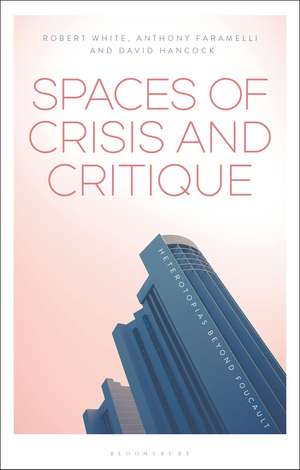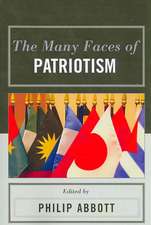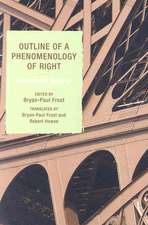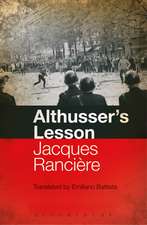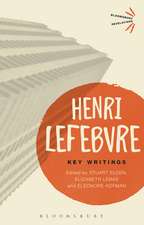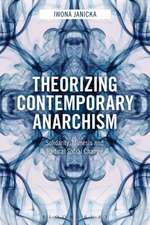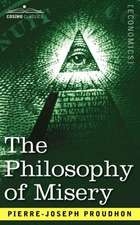Spaces of Crisis and Critique: Heterotopias Beyond Foucault
Editat de Anthony Faramelli, David Hancock, Robert G. Whiteen Limba Engleză Paperback – 18 mar 2020
| Toate formatele și edițiile | Preț | Express |
|---|---|---|
| Paperback (1) | 222.46 lei 6-8 săpt. | |
| Bloomsbury Publishing – 18 mar 2020 | 222.46 lei 6-8 săpt. | |
| Hardback (1) | 713.72 lei 6-8 săpt. | |
| Bloomsbury Publishing – 19 sep 2018 | 713.72 lei 6-8 săpt. |
Preț: 222.46 lei
Preț vechi: 287.71 lei
-23% Nou
Puncte Express: 334
Preț estimativ în valută:
42.58€ • 46.27$ • 35.79£
42.58€ • 46.27$ • 35.79£
Carte tipărită la comandă
Livrare economică 21 aprilie-05 mai
Preluare comenzi: 021 569.72.76
Specificații
ISBN-13: 9781350155299
ISBN-10: 1350155292
Pagini: 176
Dimensiuni: 156 x 234 x 13 mm
Greutate: 0.26 kg
Editura: Bloomsbury Publishing
Colecția Bloomsbury Academic
Locul publicării:London, United Kingdom
ISBN-10: 1350155292
Pagini: 176
Dimensiuni: 156 x 234 x 13 mm
Greutate: 0.26 kg
Editura: Bloomsbury Publishing
Colecția Bloomsbury Academic
Locul publicării:London, United Kingdom
Caracteristici
Revitalizes an aspect of Foucault's thinking that has significant contemporary relevance, particularly in environmental, biopolitical and geopolitical contexts
Notă biografică
Anthony Faramelli is a Research Fellow at Kingston University, UK.David Hancock is Senior Research Assistant at Buckinghamshire New University, UK. Robert G. White is a PhD student at the London Graduate School, Kingston University, UK.
Cuprins
Introduction Chapter 1: 'Literature-Outside-Space: Foucault, Sade and Tales of Terror' Fred Botting, Kingston University London, UK Chapter 2: 'The Living Space of the Image'Julien Reid, University of Lapland, Finland Chapter 3: 'Inside Comfort: The Interior and the Immune System' Dr Sheena Culley, Independent Scholar Chapter 4: 'Spacing the interior: The Carceral body as heterotopia in contemporary Palestinian Cinema'Robert G. White, Kingston University London, UK Chapter 5: 'The Politics of the Hidden Space: Georges Bataille and non-knowledge in the era of transparency'David Hancock, Buckinghamshire New University, UK Chapter 6: 'Mirrors and Masks: The Political Space of Zapatismo'Anthony Faramelli, Kingston University London, UK Chapter 7: 'In the Beginning All the World Was America' Claire Colebrook, Pennsylvania State University, USAIndex
Recenzii
A fascinating compilation of provocative essays. Foucault's concept of 'heterotopia' is the departure point for many of the authors in this collection - allowing them to 'think differently' about a diverse range of issues. They are to be complimented on a sophisticated reading of heterotopia which avoids the all-too-frequent interpretation of this in terms of absolute, physical space. This allows the authors to develop and extend Foucault's thinking and that of a range of other 'post-conventional thinkers', to develop novel critiques of the present and of contemporary politics. Readers interested in resistance politics, in theorising vulnerability and in the development of a minoritarian-ethics will find this book thought-provoking.
When the freedom even to imagine new forms of life and political organisation is denied by the assertion that there is no alternative, the notion of heterotopias takes on particular importance. The papers in this valuable collection draw on the work of Michel Foucault and Edward Soja to elaborate the critical and disruptive force of spatial thinking. Transdisciplinary and political, the writing in this outstanding volume is a powerful demonstration of this force in action.
Spaces of Crisis and Critique takes Foucault's all too brief account of heterotopias as an invitation to investigate the hidden and the overt spaces where a politics of resistance is still possible. In foregrounding the aesthetic, as an opening on to the political and philosophical, the collection poses critical questions to those who think of politics as a science. It puts in to question inert disciplines which act as boundary keepers to critical knowledge, and it foregrounds the centrality and complexity of spatiality to any thinking of the political. From Faramelli's account of Zapatista resistance to Colebrook's illuminating account of the spatial metaphors of light and dark in the American political imaginary this superb book reanimates Foucault studies. More importantly it fosters critical thinking in the spaces where neoliberalism has not yet forced things to be held to account. This collection should find its way on to the shelves of those committed to the aesthetic remaking of our political imaginaries.
When the freedom even to imagine new forms of life and political organisation is denied by the assertion that there is no alternative, the notion of heterotopias takes on particular importance. The papers in this valuable collection draw on the work of Michel Foucault and Edward Soja to elaborate the critical and disruptive force of spatial thinking. Transdisciplinary and political, the writing in this outstanding volume is a powerful demonstration of this force in action.
Spaces of Crisis and Critique takes Foucault's all too brief account of heterotopias as an invitation to investigate the hidden and the overt spaces where a politics of resistance is still possible. In foregrounding the aesthetic, as an opening on to the political and philosophical, the collection poses critical questions to those who think of politics as a science. It puts in to question inert disciplines which act as boundary keepers to critical knowledge, and it foregrounds the centrality and complexity of spatiality to any thinking of the political. From Faramelli's account of Zapatista resistance to Colebrook's illuminating account of the spatial metaphors of light and dark in the American political imaginary this superb book reanimates Foucault studies. More importantly it fosters critical thinking in the spaces where neoliberalism has not yet forced things to be held to account. This collection should find its way on to the shelves of those committed to the aesthetic remaking of our political imaginaries.
